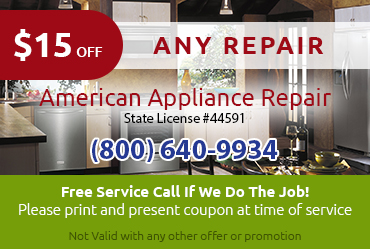
Get the most from your appliances with our expert use & care tips.
At American Appliance Repair, your satisfaction with your appliances is important to us. Here are some appliance use & care tips that will help you prolong the service life of your appliances and get the best possible performance from them.
General Use & Care Tips
Read your manual: This is our number one tip for each and every appliance you own. After all, when it comes to use & care the manufacturer knows best. By reading your manual and following all the manufacturer’s instructions, you can enjoy the high level of performance and efficiency your appliance was designed to provide.
Address problems promptly: If you notice that your appliance is not performing like it should, don’t ignore the problem. If you do, it is only likely to get worse. For your own convenience as well as to prolong the service life of your appliance, you need to be proactive. If you cannot correct the problem on your own, do not hesitate to call us for professional troubleshooting and repair.
Appliance-Specific Tips
Refrigerators & Freezers
- Give it space: Most refrigerators require at least one inch of space between the unit and the wall to allow for air flow.
- Keep it clean: Refrigerator condenser coils should be vacuumed twice per year to remove hair and lint that would otherwise interfere with the cooling power of the coils.
- Save energy: You will get the best energy efficiency from keeping your fridge and freezer on the temperature settings recommended by the manufacturer. Fridges and freezers also hold cold better when they are at least half full.
- Replace water filters: If you have a water dispenser or ice maker, you need to replace the filter about every six months or as recommended by the manufacturer.
Washers
- Use the right detergent: If you have an HE washing machine, you must use HE detergent. If you try to use regular detergent, it will produce way too many bubbles, which may actually overflow from your machine.
- Upgrade your hoses: Plastic or rubber water hoses can become brittle and leak or burst. To avoid this possibility, consider upgrading to braided steel hoses.
- Let it dry: To prevent mold or mildew from developing in your washing machine, it is a good idea to leave the door or lid open between cycles. You should also leave the detergent tray open and wipe down the door gasket on your front-load washer between uses.
- Run the cleaning cycle: Many new HE washers have a specific cleaning cycle that you can run periodically to help remove soap residue from the unit. This helps keep the washing machine smelling fresh and clean. If your washer does not have a cleaning cycle, run it empty on a hot cycle occasionally to clean.
- Check Pockets: To prevent loose items from getting trapped in the workings of your washing machine, always check the pockets in clothes before washing.
Dryers
- Remove lint: The lint traps are not the only place where lint can accumulate and present a fire hazard. You also need to clean out the cavity where the lint trap is housed. Once every few months should be sufficient. The exhaust duct and the external dryer vent need to be cleaned at least twice per year.
- Ditch the fabric softener: fabric softener sheets release a residue that makes laundry feel nice and soft. Unfortunately, this residue can also coat your moisture sensor, which will prevent the dryer from turning off automatically when clothes are dry.
- Don’t overload: Stuffing too many items in the dryer impedes air circulation and make the load take longer to dry. Even worse, a heavy load can put strain on important parts like dryer belts and cause premature failure.
Dishwashers
- Scrape dishes: While you should not actually have to prewash your dishes before loading the dishwasher, you should scrape them to remove the larger food bits. This will help prevent drain clogs.
- Clean the sprayer arm: Over time, sprayer arm holes can get clogged, which will prevent water jets from reaching all your dishes. It is a good idea to clean the sprayer arm every so often to help avoid this problem.
- Don’t overload: If you cram too many dishes into the dishwasher, some of them probably won’t get cleaned properly.
- Don’t use too much detergent: Using too much detergent can leave spots on your glasses as well as gum up the works with residue.
Cooktops
- Clean spills promptly: Sugary spills can cause cooktops to yellow, while acidic spills can mar the finish. Cleaning spills up quickly is also much easier than waiting until they are cold, dry, and hard.
- Keep burner bowls clean: In a gas cooktop, the burner bowl actually helps reflect heat back to the pot. If your burner bowls are black and dirty, you won’t get any heat reflection and your cooktop will be less efficient.
- Don’t drag pots: If you have a glass or ceramic cooktop, you never want to drag a pot or pan on it as any grit or rough spots on the bottom could scratch your cooktop.
- Use non-abrasive cleaner: Whether you have a flat cooktop or not, abrasive cleaners have the potential to scratch the finish on the cooktop. Instead of scrubbing away baked-on food with a harsh cleaner, use a product specially made for cooktops or a paste of baking soda and water.
- Careful with bakeware: Never put hot glass bakeware on your glass or ceramic cooktop to cool.
Ovens
- Self-clean sparingly: The self-cleaning cycle heats the oven to extreme temperatures, which some ovens are not really designed to withstand. Occasionally, this can cause damage to important components like fuses and control panels. The risk of damage is increased if you overuse the self-cleaning feature, so it is advised to do most of your cleaning by hand and only use the self-cleaning feature for heavy-duty messes.
- Clean racks in the sink: If you leave your oven racks in the oven during the self-cleaning cycle they may warp. Racks can be cleaned in the sink with soap and water.
- Don’t peek: Opening the oven door to check on your food lets out heat, wasting energy and increasing cook times. Keep your glass clean so you can check food without opening the oven.
Trash Compactors
- Fill the unit: Before running your trash compactor, you should fill up the bin completely.
- Use the right bags: It may be tempting to use ordinary garbage bags in your trash compactor, but in reality you need to use the manufacturer’s bags in order to prevent jams.
Garbage Disposals
- Use cold water: Use plenty of water when running your garbage disposal to help flush food debris through your pipes. Cold water is best because it cannot carry greasy residue in solution and coat your pipes like hot water can.
- Beware of clogs: Over-feeding your garbage disposal can clog the unit as well as your pipes. Be especially careful with stringy or fibrous foods that can get tangled in the disposal blades.
- Control odors: To help prevent smelly residue from collecting in your garbage disposal, run clean, hot soapy water through it occasionally. You can also grind up citrus peels or specially designed cleaning pellets for a fresh scent.




